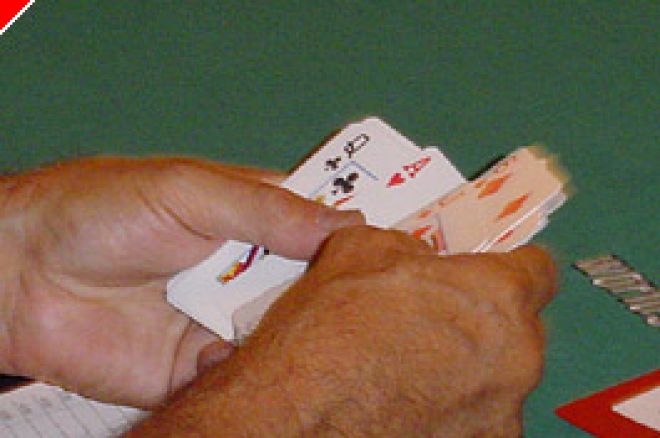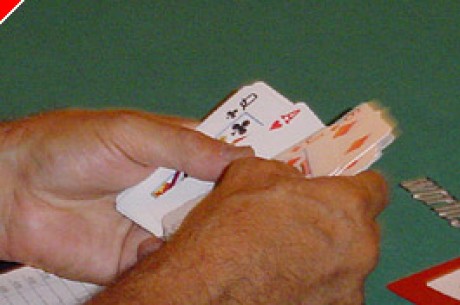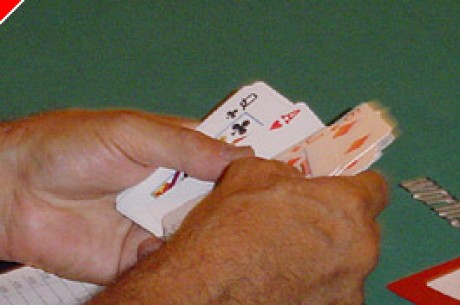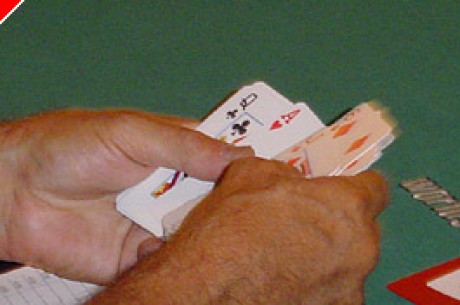Stud Poker Strategy - Chasing, Part Two

As the stakes go up in stud, the antes and the forced bets tend to grow as a percentage of the small bet. For example, though the conventionally structured $10/20 game has a $1 ante and a $3 bring-in, the $20/40 game has a $3.00 ante and a $5.00 bring in. At $10/20 you're betting $10 on Third Street to win $11. At $20/40 you're betting $20 to win $29. If the structure were identical in the higher stakes game you'd be betting $20 to win $22.
Because of this, it makes relatively more sense to chase after the pot - it's more worth chasing after. In addition to chasing in the situations I described in the game above - it often makes sense to chase in additional situations caused by the relatively larger initial pot. Sometimes, in fact, it makes good sense to do two things simultaneously - chase after a one hand that is ahead while at the same time chasing away other people who might otherwise be tempted to chase along with you.
Here's a hand I played the other day in a $20-$40 game at the Foxwoods Resort Casino poker room in Connecticut that illustrates the point. There were eight players. I was No. 1. I was perceived as very tight and very aggressive. The other players tended to play loosely on third and fourth street and tight thereafter. The exception was the No. 5 seat who was extra loose and aggressive early on. He was close to being a maniac.
I was dealt (Ah 6h)6c. No. 2 brought it in with a 2c. 3d folded. Qd folded. No. 5 raised with a Kc. No. 6 called with a Td. No. 7 folded the Ks. The No. 8 called with the 9s.
Summary: Dead cards: 3d, Qd, Ks. The Kc raised; Td called; 9s called. I had (Ah 6h)6c. 2c was to act after my action. Think for a minute about what you would have done if you were in my situation.
The traditional, conservative player in me said to fold. At first blush I thought I was probably chasing a pair of kings with just my pair of sixes. I initially thought that I'd be better off just conceding and waiting for a better hand.
But the looser, more confident, experienced mid-limit player in me said to call along. There were five cards that would give me a hand better than the kings my raising opponent was likely to have or the kings up he might improve to. Though it was a little better than 8:1 against me to draw one of those sixes or aces on fourth street, the size of the pot was large enough with the two other callers that it might be worthwhile to stay in the hand.
But I neither called nor folded. I decided that the best play was for me to raise.
Why raise you might ask? One moment I'm thinking my hand isn't strong enough to even call and the next I'm raising. It seems counterintuitive.
But when the pot is relatively large when compared with the size of the bet, it often makes sense to chase - provided you're the only one doing the chasing.
Here's my thinking on it. First, I determined that it made sense for me to chase the raiser with my sixes and ace kicker. I realized that I was very close to having an even money chance at winning the pot with my lower pair and higher kicker hand. I was only about a 48:52 underdog going to the river against a pair of kings. And when I factored in the chances that he was overplaying a hand that wasn't a pair of kings, I realized that I might actually be in the lead against him.
But, and this is a very big but, it only made sense to chase him if I could chase him heads up!
This is very important. When you have a live lower pair and a higher kicker (and even more so if the kicker is suited), it often makes sense to chase a pair bigger than your pair but lower than your kicker. But this is only true if the hand is heads up - not multi-way. In a multi-way hand this kind of chasing usually doesn't make sense. Your winning percentage plunges as you add opponents. When you consider your betting action with this goal in mind, and then consider the likely reaction from the other players, then raising is really the only play.
My raise caused the bring-in, who acted immediately after me, to fold. Had I just called the initial raiser, the bring-in would have only faced a $15 bet ($20 minus the $5 he had already put in). Being a loose player early on he might well have called with nearly any holding. But for $35 he folded as I presumed he would. Similarly, the king who raised initially was true to his near-maniacal form and reraised my raise, as I expected him to. He made it two bets for the other players who initially called his raise. They too fold, as I expected them to. Had I only called, they would have been in the hand until fourth street. By raising and considering the likely reaction of my raising opponent, I was able to manipulate my other opponents into folding — getting the heads up play I wanted.
A raise that succeeds in driving out initial callers is often an excellent play because of the dead money they will leave behind. It makes it a more profitable pot to chase after. The more dead money in a pot on third street, the greater reason there is to fight for it.
There was another possibility as well that I needed to factor in. The initial raiser might not have had the pair of kings he was representing. He was, after all, very loose and aggressive and might have been bluffing. He also might have assumed, based on my super-tight and aggressive image that I had a pair of aces. If that were the case he might well have folded when I raised. That would have been fine as well. I'd have been happy to either take down the pot when everyone folded or play my sixes and ace kicker against some mediocre holding by my opponent.
In the long run, clearly, putting myself in a position to chase heads up by raising was the right move. As it turned out in this hand, however, I didn't hit my Aces up. I only improved to two low pair and he improved to kings up, winning the pot. Sometimes, of course, you chase and don't catch up. But that doesn't make the chase wrong - just unlucky.
Ed Note:Noble Poker has 6 handed single table tournaments that we think are easy pickins...get in on the action








